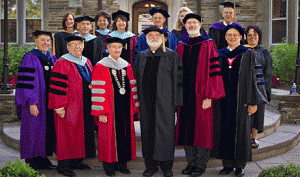This morning I took an earlier bus to MHS for a library orientation for new PhD students. While technically, I’m not a new PhD student, it has been over 3 years since I had a library orientation, so I figured I could use some help remembering and learning what is new. This session was informative and helpful. And there is a new online search program, with some new features. Have you had access to a “virtual shelf” where you can see the titles/authors (and book covers for some) which would appear on the physical shelf next to the searched book.
And it is good to have a personal connection with two of the library staff. One used to teach immigrants at Anya’s school, so she’ll be a good one to network with for ideas about how to support Anya in her language learning [or with whom to network {for Elenn’s sake}].
One of the “new” PhD students. Marit, is one I know from the Philosophy of Science course I took in January 2015. She was also renewing her library acumen. We were chatting a bit, and part of this was my “I’ll never be James Barr” (see Feb. 25 blog) spiel as we have to cook, clean, and take care of the children as well as work and do a PhD. We were pondering if our increasingly egalitarian society will limit these mono-dimensional people, who only have to focus on their work as they have a servant spouse/wife at home. Then Marit relayed that in Norway, intellectuals (like James Barr) aren’t really highly valued. There is a higher value on pragmatic work that benefits the greater good. I find this extremely fascinating, which I will be pondering for a long time. I think she said that this is what my adviser, Knut, said in this introductory PhD start up course, so I want to chat with him about this. (Knut is also the Prorector for Research.) We meet on Monday, as I laid out some pragmatic questions about my dissertation after the qualitative research course this last week.
One related issue to the Norwegian value of pragmatic work is also the Norwegian value of egalitarianism. So, when a student here is conferred with a PhD, there is no formal “dressing ceremony’ like Oxford University has. According to my friend, Beth with a D.Phil. from Oxford, you aren’t really finished until you go through the “dressing ceremony” where you come out of a room in your academic regalia (the fancy robes with the velvet swatches on the sleeve and the fancy hat that isn’t a mortar board). Like these faculty.

In Norway, there is no academic regalia, as that isn’t very egalitarian, and now I know, it also is contrary to the Norwegian higher value on pragmatic work for the greater good. (Now we could argue, did intellectuals like Newton, Einstein, Marie Curie, Alan Turing, and Rosalind Franklin, not have a huge impact on the greater good?!?)
Knut says that they have had to develop some sort of regalia for some students from Africa, as some are expected to have this visible sign of status within their culture.
A final note on a pragmatic value I have. On that night when I met Jane Barr at the Oxford Reception in November of 2007 (see Feb. 25 blog), I also met one of the Hebrew Bible (Old Testament) professors, Dr. John Day, who is the world’s leading expert on Molech (the idol to which they sacrificed babies). You can read his book on this, Molech: A God of Human Sacrifice in the Old Testament (1989). While a curious topic, I realized that I wanted to research something that has some significant value for the church today beyond scholarship, since sacrificing babies to idols is not done. (If you want to argue about other kinds of human sacrifice to other kinds of idolatry today, the cognitive leap is too wide for scholarship, but an underlying principle of the sacredness of life could be found. However, this principle would be found in other texts that would be less oblique.) I’m grateful for these scholars (my bibliography!), and have come to know the brilliance of a few personally. However, my research endeavors to build bridges of understanding across cultures on biblical texts. In light of all the ethnic and religious conflict, I do hope to contributed to the greater good by demonstrating the value of learning from other cultures, helping to develop better methods for doing so in biblical studies, and strengthening the intercultural relationships within the church.
Plodding along,
Beth